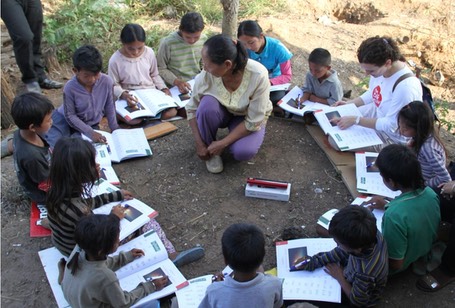After a few decades of war, Cambodia has become not only one of the least developed countries in Asia, but educational system has severely been affected. Under the Khmer Rouge's rule, not only nearly two million people died, but all schools were closed for more than four years. Learning was prohibited, many school buildings were destroyed and the majority of teachers lost their life. After the Khmer Rouges, it took more than a decade to re-establish the school system.
As a result, illiteracy has become one of the major problems Cambodia is facing. Today, despite the gratuity of the school system, the majority of people living in rural areas are illiterate, and exposed to shame, exploitation and poverty.
As a result, illiteracy has become one of the major problems Cambodia is facing. Today, despite the gratuity of the school system, the majority of people living in rural areas are illiterate, and exposed to shame, exploitation and poverty.

The Bible Society's ministry and the Literacy challenge
Opportunity 21's Generation of Hope - When the Bible Society in Cambodia ran its O-21 program from 2000 - 2003, the aim was to enhance Bible reading among the Cambodian youth, and help them in sharing the Scripture to others. The Bible Society organized many workshops for the youth, and developed Scripture materials for them to be used during evangelistic activities. Teams of youth volunteers representing the Bible Society were sent to different parts of the country for Scripture distribution. After distribution, the teams all made the same comment: the majority of people living in rural areas cannot read.
After a survey among Churches and rural communities, the Bible Society in Cambodia came to the conclusion that its effectiveness in Scripture distribution depended on how it addresses the literacy issues, which is one of the major social challenges Cambodia is facing today.
According to national statistics, the literacy rate in Cambodia today is 79.1% (definition: a person is literate who can, with understanding in both reading and writing, make a short simple statement on his/her everyday life).
While the percentage of the literate population in the cities is much higher than average and national statistics, the reality for those living in the remote parts of the country and among under-privileged is entirely different. In many villages from rural areas, the percentage of those who cannot read can reach as high as 90%.
The beginning of the Bible Society's 'Learning Through Listening' Program
Reading has always been part of daily life for Christians, either for personal or collective experience. Unfortunately, a good number of Cambodian Christians in rural areas cannot read. Being non-literates, they cannot fully take part in Church activities such as worship, Bible study, let alone devotional time.
In 2003, in response to this social challenge and urgent need, the Bible Society in Cambodia launched an eighteen month pilot literacy program, targeting the rural Christian communities and the poor living in the slums of the capital. The objective was to support the Church in their effort to encourage its members to read the Bible.
The program called "Literacy: Learning through listening" consists in organizing a class of 10 students with one facilitator, using audio-recording and textbooks as tools. The textbook contains 37 lessons and each lesson has a simple Bible text integrated into the learning process. The program is designed for one hour daily group learning, five days a week and for a period of three months. After this period, students can read simple Scripture texts, such as New Reader portions.
Class organization
"Literacy: Learning through Listening" (LTL) consists of organizing a class of about 10 students with one facilitator, using audio-recording and textbooks as tools.
The Bible Society is working closely with the local Church leaders, who organize class room in the Church building or at a house of one of the villagers.
The Bible Society provides literacy package to each class. Each package contains 10 text books for students, one facilitator's text book and a set of 37 audio cassettes or CDs, and a car battery. Most Cambodian villages are not connected to electricity networks. Therefore, car batteries are necessary to operate the Cassette or CD player.
The Bible Society staffs visit the project at least once during its 3-month duration, and after completion of each class the Bible Society provides New Reader Scripture materials, and possibly a New Testament, to those who have successfully completed the program and gained reading ability.
Several times a year the Bible Society organizes facilitator training workshops for prospective facilitators.
Student Profile
The BSC Literacy Program, which initially targeted non-literate adult Christians, has now become a learning avenue for youth and children, Christians and non-Christians alike.
Many of the youth population of rural Cambodia have not had the opportunity to be educated due to the past difficulties of the country. As industries are developing in the country, to get employment one must know how to read. These young people cannot afford to go back to school or attend the government's literacy class that takes 3 years. They turn to the Bible Society's Literacy program, to get reading skills.
The lack of teachers and inadequate salaries paid to government school teachers has also contributed to the rise of illiteracy among children. The average school teacher can teach his or her students only two hours a day, as they have to take on a second or third job to earn additional income to support themselves or their families. In many cases, there is only one teacher available for 80 children. As a result, the early years of schooling are affected, and after three or four years attending school, many children cannot read a basic text. Presently many classes are organized for the young children, which allow them to have adequate reading skills to continue in the government schools.
Impact:
The literacy program brings deep change wherever it is implemented. Whole communities are touched and transformed. People's lives, families, communities and villages are not the same anymore. It often takes one person to try the program and very soon there is a snowball effect all around.
Parents who start reading can help their children with school work and encourage them to study. They don't feel inferior any more. Many people can start a small business as they can calculate. They feel empowered and confident. They are not afraid to be cheated by their customers anymore. Life becomes easier and more productive. They have a future and a hope for their family.
Children who have taken the program can catch up with school and they become more advanced than the school system. They start dreaming about having a career and becoming a teacher... Teen agers who felt inferior and ashamed at school because they had to miss school often to help the family with working in the fields have caught up and are confident among their peers. They don't feel like outcasts anymore.
Feeling empowered gives the will to change one's life for the better. People on the program start dreaming about a better life. Small businesses are starting and parents can look forward to feeding their families and providing instead of surviving off a day laborer's wages.




